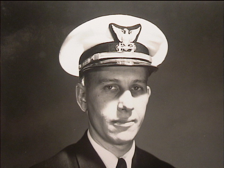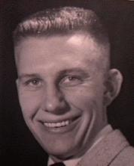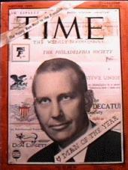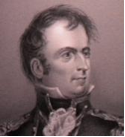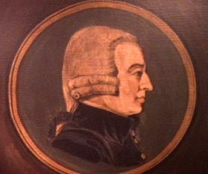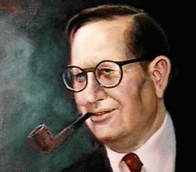Tribute to Don Lipsett: Founder of the Philadelphia Society
Tribute to Don Lipsett
Founder of the Philadelphia Society
by William F. Campbell
Don Lipsett was born August 9, 1930, in Woodburn, Indiana. He received a B.S. in Business and an M.B.A. from Indiana University. He joined the U.S. Coast Guard where he was a search and rescue officer in the 9th District, with the rank of Lieutenant JG. His lifelong interest in naval history led him later to Commodore Stephen Decatur. In fact, many came to call Don “The Commodore.”
Don’s interest in politics started with his duties as an advance man for Bill Jenner’s campaign for the United States Senate. Late in his life, Don founded the Bill Jenner Society, which meets annually in Indianapolis to commemorate the achievements of the late Senator. Its characteristic motto was pure Don Lipsett, “Loyalty to Friends!–Never Forget an Enemy!”
Moving east to further the conservative cause, Don settled in New York where he worked for the Foundation for Economic Education and The Freeman in the early 1950s. He then worked closely with the newly founded National Review and its dynamic young editor, Bill Buckley. Presumably at this time he developed his love for the aristocratic individualist writings of Albert Jay Nock and the caustic, if cheerful, libertarian writings of H.L. Mencken represented so well in his personal library, now at the I.S.I. Headquarters in Wilmington.
After several years, Don returned to Indianapolis and worked for the Indiana Manufacturer’s Association. Of special significance for the conservative movement, Don was appointed the Midwestern Director (Indianapolis) and subsequently the National Field Director (Philadelphia) of the Intercollegiate Society of Individualists (ISI) or, as it subsequently became named, the Intercollegiate Studies Institute. He nurtured dozens of clubs, student leaders, and faculty members to wage conservative battles on the nation’s liberal campuses.
I first got to know Don through my father, Al Campbell, who was Pierre Goodrich’s law partner in the firm of Goodrich, Campbell and Warren. Dad had met Don in the very early years of Don’s work at ISI in Indianapolis. As a result, dad became involved with the work of ISI and became close friends to Vic Milione as well as Don.
Don put his business education to some use by becoming a stockbroker with Paine, Webber, Jackson, and Curtis in Indianapolis. It is hard to picture Don as a stockbroker supposed to hold regular hours. Imagine the manager of the Paine, Webber office trying to figure out a broker who might amble into the office when the market was about ready to close.
One of my favorite memories was the time that Helen and I were allowed to take a tour of the apartment in Indianapolis that Don Lipsett shared with his lifelong friend, Stan Evans. Both unmarried they were the original Odd Couple. But neither one of them was a Felix; both were Oscars.
Don was never one to maintain regular hours. Don was a “night person” addicted to late night telephone conversations with such persons as Frank Meyer. In fact, one of the many organizations which he created was The Nicodemus Society named after Nicodemus because he came to Jesus in the dead of night.
Sadly, I must also report that my father, Albert M. Campbell, was a casualty in the war dedicated to making Don Lipsett a respectable middle-class person. I think he knew in his heart of hearts that the cause was a hopeless one. Don always used to sign his letters to my Dad as Your Obedient Servant. Servant, yes; Obedient, no. Dad usually referred to Don as the Commodore, but on one occasion he signed his letter to Don, Your Disobedient Servant.
If Don, in turn, was a disobedient servant to Paine, Webber, he was a loyal servant to ISI. Don once admitted to my Dad, that instead of doing his “overdue Paine, Webber homework” one Saturday night, he was working on a “list for the ISI seminar.”
But what kind of a man was Don? Is there anything about being a Hoosier which could draw together such disparate men as Don and Pierre Goodrich?
Peter Viereck states in the opening of his 1956 book, The Unadjusted Man: A New Hero for Americans: “The fight is for the private life; abstract ideologies are Saharas. The Overadjusted Man knows only the public life.” Neither Don nor Pierre could be accused of being Overadjusted men. They were unadjusted men devoted to the cause of liberty.
They fought this battle often together even where their strategies differed. In fact, the famous 1959 or 1960 Brown County meeting of the Indiana Conservative Club had for its speakers, Milton Friedman, Frank Meyer, and Richard Weaver. Stan Evans opened up the meeting, according to the schedule, at 9:30 with, “What We hope to accomplish.” It is doubtful that the meeting actually started at 9:30. It is legendary that Pierre Goodrich was very upset with Don because the meetings did not start on time.
Don once even went so far as to opine to my father that, “I think Pierre should hire me to help him with the Liberty Fund and his other foundations, but haven’t heard anything from him.” This was in 1967. What if Pierre had hired Don Lipsett? About all we can say in true Smithian fashion, is that there would have been an end which was no part of their intention. As it was both went their separate ways, creating unique institutions which have stood the test of time and have never wavered from the original intent of their founders.
My relationship with Don deepened as the years went on. My wife, Helen, another Hoosier from Shortridge High School, had known Norma Huron and introduced her to Don. They were married in 1962.
Our memories of Don and Norma cover many wonderful trips and visits. Charlottesville, Europe, and yes, we even got Don to go to the beach in Florida with us after I had moved to Louisiana. He would amble down with his pipe, National Review, Time Magazine, and the Wall Street Journal about 3:00 in the afternoon, cavort in the water for about 5 minutes and go back up. But he had done the beach and could not be faulted.
A very important person in both of our lives was Erik Ritter von Kuehnelt-Leddihn. Not only did we visit him in Austria, but he also visited us all here in the United States. In fact, in loyalty to Erik, on one European trip, Don and Norma, Ed and Linda Feulner, Helen and I went to visit the residence of the Archduke Otto von Habsburg! Don was one of the most important American supporters of Erik whose connections with National Review and ISI gave him many American friends and supporters.
In 1964 through the contacts that he had made with such conservative leaders as Milton Friedman, Bill Buckley, Russell Kirk, Frank Meyer, and Wilmoore Kendall, Don founded The Philadelphia Society, which was the crowning achievement of his career. He was to serve as the Permanent Secretary of the Philadelphia Society from its founding in 1964 until his death in 1995.
Don also served as senior staff member of the American Security Council and as the Executive Secretary of the American Conservative Union. He moved to North Adams, Michigan, and served as the Director of Foundation Relations and Director of the Center for Constructive Alternatives at Hillsdale College. He was elected to membership in the Mont Pelerin Society in 1971. From his base in North Adams, he edited its newsletter for four years.
Don Lipsett was known for his love of the great naval hero, Commodore Stephen Decatur. Decatur was known for his defeat of the Barbary Pirates and his sturdy American patriotism. He was on the “shores of Tripoli” when he destroyed the captured frigate, Philadelphia. Don’s favorite print of the Commodore was when he engaged in hand-to-hand combat with the treacherous Tripolitan captain who had killed his brother James.
In honor of Decatur, Don created the Stephen Decatur Society and the famous Decatur Shop of North Adams, Michigan. He bought and read books, acquired prints, statues, and postcards of the various metropolises of the U.S. named after his hero, such as Decatur, Illinois.
Don, of course, knew that Stephen Decatur’s famous toast was more complicated than, “Our Country, right or wrong!” which he put on the letterhead; he in fact quotes the more accurate version in his compilation of facts to “facilitate the scheduling of suitable annual activities”: “Our country! In her intercourse with foreign nations, may she always be in the right, and always successful, right or wrong.” He also noted consistent with his belief in free market economics that the famous toast was delivered in the Exchange Coffee House, Norfolk, Virginia on April 4, 1816.
Don’s famous stationery for the The Stephen Decatur Society, i.e. the S.D.S. (the irony did not escape him), had the eagle displayed with the arrows in both talons. This was only one example of Don’s love of eagles.
His dedication to the memory of the Commodore Stephen Decatur led him to take me one time to the cemetery at Bladensburg, Maryland, where Decatur was shot in a duel with the infamous James Barron. Decatur subsequently died in the Decatur House on Lafayette Square in Washington D.C. which was Don’s favorite residence in Washington.
The other world-famous product of the Decatur Shop was the Adam Smith Necktie. Designed by Norma, it was produced and promoted during the Reagan Era. The tie became a universally recognized symbol of free men and free markets. Less well known were the Adam Smith sweatshirts, scarves, and cummerbunds put out by the Stephen Decatur Shop.
Don of course accompanied his passion for Adam Smith with another letterhead, The Invisible Hand Society, alas too faint to reproduce here. But the stalwarts of the Society were given their official titles: among others Tim Wheeler was Founder, Bill Buckley was Managerial Expert, Richard Ware (spelled Eraw to protect his anonymity) was Financial Vice President, Bill Kelly was Advisor on the Extent of National Ruination, and George Stigler was Steward for Invisible Government Consultant on Invisible Conservative Majorities.
The Baton Rouge office of The Philadelphia Society is fortunate to have a Painting of Adam Smith by Norma Lipsett painted especially for Bill Campbell.
From 1977 to 1995, Don served as Counselor to the President of The Heritage Foundation in Washington, D.C.
Don Lipsett died on October 30, 1995, in North Adams, Michigan. On November 4, 1995, the Memorial Service for Don was celebrated in the Woodburn Missionary Church. His Hoosier roots were noted by Ed Feulner and Stan Evans.
Not only his fame was revealed at the Memorial Service, but the older friends of the Lipsett family learned that Don had indulged in the evil habit of pipe smoking which he had carefully, almost miraculously, kept from his family because they would have disapproved. The pipe was such an important part of Don’s life that it is hard to imagine how he kept up this deception on his visits to his family.
The marvelous portrait of Don by Tom Curtis which hangs in the Lipsett room of The Heritage Foundation not only captures Don’s love of his pipe, but also successfully preserves the twinkle in Don’s eye whenever Don was able to initiate an ongoing conversation between those whom he loved.
Don did not try to compete with a Milton Friedman, Friederich von Hayek, or Russell Kirk. But he did not hear with patience that his country was being rewritten by the radical left. When he took arms by founding The Philadelphia Society, the purpose of the Society was simply stated: “To sponsor the interchange of ideas through discussion and writing, in the interest of deepening the intellectual foundations of a free and ordered society, and of broadening the understanding of its basic principles and traditions. In pursuit of this end we shall examine a wide range of issues: economic, political, social, cultural, religious and philosophic. We shall seek understanding, not conformity.”
The death of Commodore Lipsett has not been easy for anyone. Just as the Jews leave a place at the table for the Prophet Elijah to return, so too shall we leave a place for Don at the meetings of The Philadelphia Society, the rooms of The Intercollegiate Studies Institute, and the corridors of The Heritage Foundation. If not physically present, he is with us in spirit.
We can take spiritual consolation for Don’s death in the beautiful description of friendship which Samuel Johnson gives us: “Esteem of great powers or amicable qualities newly discovered, may embroider a day or a week, but a friendship of twenty years is interwoven with the texture of life. A friend may be often found and lost, but an old friend can never be found, and nature has provided that he cannot easily be lost.” The blessing is that for many of us who have inherited the mantle, our friendships with Don extended to almost two-score years.

